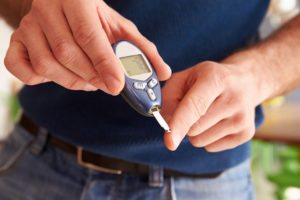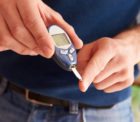Diabetes is often called a silent epidemic. The United States CDC reports that more than 30 million adults in the U.S. have diabetes, and only one in four know they have it.
Diabetes is the number one cause of kidney failure, lower-limb amputation and adult-onset blindness. It’s the seventh leading cause of death in the U.S. and the number of people with the disease has tripled over the last 20 years.
What is Diabetes?
 Diabetes is a long-lasting disease that affects how your body turns food into energy. Most of the food you eat is broken down into sugar and released into your bloodstream. Your pancreas makes a hormone called insulin, which acts like a key to let the blood sugar into your body’s cells for use as energy.
Diabetes is a long-lasting disease that affects how your body turns food into energy. Most of the food you eat is broken down into sugar and released into your bloodstream. Your pancreas makes a hormone called insulin, which acts like a key to let the blood sugar into your body’s cells for use as energy.
If you have diabetes, your body either doesn’t make enough insulin or can’t use the insulin it makes as well as it should. When there isn’t enough insulin or your body fails to respond to insulin, too much blood sugar stays in your bloodstream. Over time, this can cause serious health problems like heart disease, vision loss and kidney disease.
Type 2 Diabetes
While there are three types of diabetes, the most common form is type 2 diabetes, which is found in 9 of 10 diagnosed cases. It develops over many years and is usually diagnosed in adults. As previously mentioned, many are unaware of their condition because there are no symptoms.
According to the US CDC, it’s important to have your blood sugar tested if you have any of the following risks:
- Have been diagnosed with prediabetes
- Are overweight
- Are 45 years or older
- Have a parent, brother, or sister with type 2 diabetes
- Are physically active less than three times a week
- Have ever had gestational diabetes (diabetes during pregnancy) or given birth to a baby who weighed more than nine pounds
- Are African American, Hispanic/Latino American, American Indian, or Alaska Native
Diabetes has no cure, but there are ways that patients can effectively manage this disease. A healthy lifestyle that includes exercise, healthy eating and taking prescribed medicine can greatly reduce the impact of this disease.
Androscoggin Home Healthcare and Hospice offers diabetes education services to providers, the community, and patients about managing diabetes.
Our Certified Diabetes Educator can help you:
- Make better decisions about your diabetes.
- Work with your healthcare team to get the support you need.
- Understand how to take care of yourself and learn the skills to:
- Eat healthy
- Be active
- Check your blood sugar (glucose)
- Take your medicine
- Solve problems
- Cope with the emotional side of diabetes
- Reduce your risk of other health problems
If you’d like more information, speak with your physician about diabetes education services. You can also contact our Intake Team at 207.777.7740 or 1.800.482.7412 to learn how we can help you manage your type 2 diabetes.


